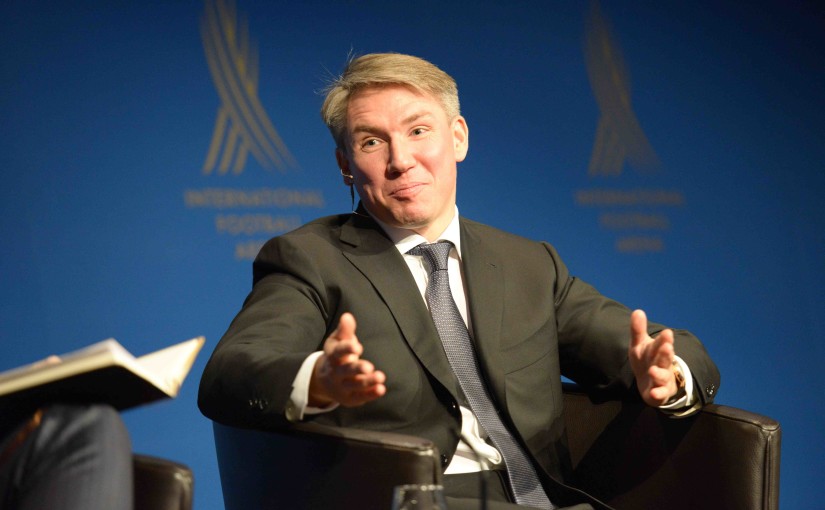By Andrew Warshaw in Zurich
November 20 – Alexei Sorokin, the man running the 2018 World Cup in Russia, has spoken out for the first time in public about Sepp Blatter’s remarkable claim of a pre-vote deal that cast growing suspicion on how both the 2018 and 2022 tournaments were won and lost.
Blatter claimed earlier this month that unnamed leading members of his top brass agreed to hand the tournament to Russia before the December 2010, ballot with the 2022 event to go to the United States.
The latter part of the accord, claimed Blatter, was scuppered by Michel Platini’s decision to switch sides and vote for Qatar for 2022, taking some of his UEFA voters with him.
But Sorokin, CEO of Russia’s organising committee, has questioned the authenticity of such an agreement.
“An agreement between who?” Sorokin told the International Football Arena conference in Zurich. “There were people who openly told us they would prefer to go to somewhere else. Such an agreement in a classic sense wouldn’t be possible.”
Sorokin suggested Blatter’s comments had been widely misinterpreted and hinted of a western-led sour-grapes strategy against his country.
“The way I read it is that the implied sense was that it would have been understood and welcomed by a certain group of people if the World Cup went to Russia,” he said.
“We are getting tired of offsetting constant allegations, suspicions. People want to see in these words what they want to see based on a climate of finger pointing. I didn’t see anything malicious.”
When it was pointed out to Sorokin that England, for instance, received only two votes, he provided a telling insight into the nuances of any bid process. “The worst thing you can do in bidding is start counting votes. It becomes very twisted. We deliberately stayed out of this futile exercise.”
Those casting aspertions on Russia, he said, risked harming the World Cup’s image.
“It’s very important not to throw the baby out with the bathwater. We need to preserve the thing with the most value which is the World Cup itself and not destroy everything.”
Sorokin’s appearance came amidst Russia’s damaging athletics doping scandal that has implicated Vitaly Mutko, the sports minister, who was criticised last week by the World Anti-Doping Agency. Mutko chairs Russia’s World Cup local organising committee and has also been a FIFA executive committee member since 2009.
The WADA inquiry revealed that scores of samples had been destroyed and the testing laboratory in Moscow has lost its approved status. “I’m not part of the decision whether and when our lab restores its accreditation,” said Sorokin. “But even if it does not, it will have no impact on the success of the World Cup. Some countries have hosted that have no lab at all.”
“Is it something we could have done without? Yes but let’s differentiate between speculation, opinions and facts. If there are facts we are happy to consider them. Mr Mutko has been entrusted with holding an investigation to find who is responsible for what occurred in our anti-doping efforts. But we can’t work with just finger-pointing. Anyone can say anything about a certain official but how well founded it is…let’s deal with facts.”
The other issue that continues to plague 2018 organisers is racism, for all Russia’s attitude of self-denial.
The government recently appointed an anti-racism tsar to go round the country identifying incidents but will the problem be eradicated in time for the World Cup?
Sorokin still refuses to acknowledge there is a pervasive trend of racism in Russian football but promises steps will be taken to combat what he calls “unwanted incidents.”
“There is no place for racism during the World Cup. The Russian Football Union has appointed a specialist delegate whose task it is to develop a proper strategy. (But) We are a country of 140 million with over 100 ethnic groups. We couldn’t possibly be a racist country and I would strongly argue with anyone who says otherwise.”
Given the recent downing of a Russian airliner and increasing threats of terrorist attacks, Sorokin is also aware of growing fears about travelling to any country that could be a target and gives the following re-assurance. “I don’t think we can be any more serious about security than we have been and are,” he said. “We are certain our security forces will ensure the necessary level of public safety.”
Contact the writer of this story at moc.l1735045574labto1735045574ofdlr1735045574owedi1735045574sni@w1735045574ahsra1735045574w.wer1735045574dna1735045574

